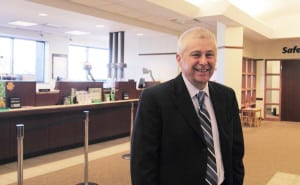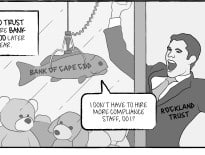James C. Lively
Title: President and CEO, Bridgewater Savings Bank
Age: 65
Experience: 40 years
James Lively first arrived at the doorstep of Bridgewater Savings Bank 33 years ago to interview for a position as treasurer. At the time, he probably didn’t anticipate he would end up leading the bank through a considerable growth trajectory, doubling its branch footprint and increasing its asset size fivefold to $500 million. But Lively, who recently announced his impending retirement, said he’ll most miss talking to his customers. He told Banker & Tradesman, “There’s a tremendous sense of satisfaction in knowing a customer, having worked with a customer and seeing that customer be successful.”
Q: Can you outline some of the bank’s growth over your time at the helm?
A:A lot of the bank’s growth has been parallel to the growth in Southeastern Massachusetts. When I came here in the early ’80s, this was strictly a rural area. You had a lot of farms and you didn’t have the highway system we have today, you didn’t have the commuter rail system. As the economy began to develop, you saw a lot of office parks and industrial parks being developed down in this area. You saw the entrance of the commuter rail all the way down in the Middleborough-Lakeville area, all the way into Plymouth, and that brought a lot of people into this area to live and work.
We also changed from being strictly a residential/consumer lender to being a commercial- and business-oriented bank that still had the residential and consumer pieces to it. We were able to complete the whole circle of lending by being able to do commercial real estate loans, commercial lines of credit, SBA loans … We have a strong mortgage banking operation here that does just about every type of loan you can think of to get people into housing, and we do consumer lending and home equity lines of credit.
And we’ve invested a lot in technology. We’ve moved dramatically from where people came in every day and did their banking to the digital age where a lot of people use remote deposit capture or person-to-person payments or Apple Pay or Samsung Pay. We have all those features because we have to make sure that our customer base reflects the community, and our communities are getting younger, and there’s a different way that people want to have services delivered to them.
Q: As you approach retirement at the end of this year, how do you think about succession planning, in general, and your own successor in particular?
A: I have always tried to make sure that we have a strong working relationship with a lot of the folks that are here. So rather than myself going to a lot of things that are higher level, I’ve always tried to make sure the top four or five people here go to those events as well, whether it’s going to conferences or seminars or getting involved in the industry. I try to make sure they’re well rounded in that respect so that if anything should happen to any of us, it would not dramatically impact this organization, that this organization would have leadership to continue the mission.
But with [President and COO] Peter Dello Russo, who’s been working with me for 15 years, we do have that really strong personal and professional relationship. I have a lot of confidence in Peter. He’s got the right background and personality to do this job. He’s been our senior commercial lender. He’s also, through a progression, moved into the chief operating officer’s role, where he’s been in charge of retail and information technology, as well as operations area. So he’s been able to develop over a number of years a much more well rounded background than strictly lending.
I think that’s key for being a CEO. You have to have a working knowledge of a lot of areas and you have to know why things happen, not just how they happen, and you have to be able to work in a cooperative way with the department heads to make sure that things progress forward. I think he’s very well prepared to do that.
Q: The banking industry as a whole seems to struggle with developing a bench of emerging talent. How do you approach that issue at Bridgewater Savings?
A: That’s probably the biggest thing that I think even at [the Massachusetts Bankers Association] we see, is that there’s a real need for banks to cultivate and develop younger talent, and that’s a significant challenge to this business, particularly on the community bank side. The budget isn’t always there for that, but we decided we had to have the budget.
It’s why we take the interns from Bridgewater State. We pay all of our interns because our goal, hopefully, is to get them to stay. We’ve had decent success at that, but if you don’t put that in place, you’re going to have a pretty aging workforce at some point. Our mission here lately has been making sure that we not only do succession planning for someone like myself, we have to do succession planning in departments, to make sure that we have the people in those departments that can grow and if someone were to leave or retire or something happens, we can slide someone into one of those positions. That’s a big piece of what’s going on today in this business.
Lively’s Top Five Pastimes:
- Spending time with his granddaughters
- Enjoying the Cape at his home in Brewster
- Traveling with the family to Bermuda or Florida
- Riding or walking the Cape Cod Rail Trail
- Kayaking on the ponds near his home








